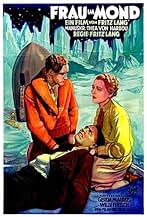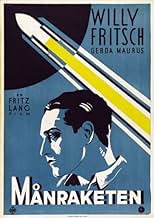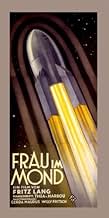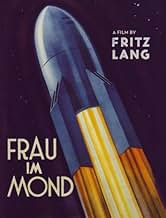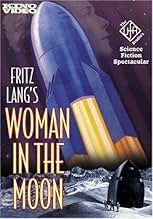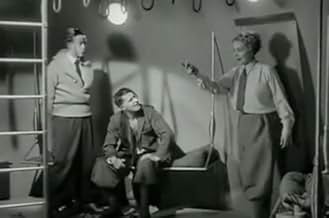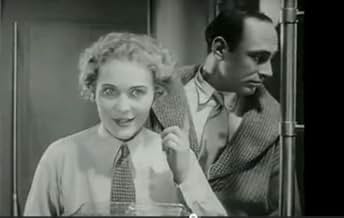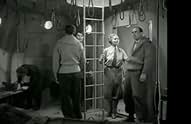NOTE IMDb
7,3/10
4,1 k
MA NOTE
Un scientifique tenace part pour la Lune dans l'espoir d'y trouver de l'or.Un scientifique tenace part pour la Lune dans l'espoir d'y trouver de l'or.Un scientifique tenace part pour la Lune dans l'espoir d'y trouver de l'or.
- Réalisation
- Scénario
- Casting principal
- Récompenses
- 1 nomination au total
Gustl Gstettenbaur
- Gustav
- (as Gustl Stark-Gstettenbaur)
Gustav von Wangenheim
- Hans Windegger - Engineer
- (as Gustav v. Wangenheim)
Alexa von Porembsky
- Eine Veilchenverkäuferin
- (as Alexa v. Porembska)
Heinrich Gotho
- Der Mieter vom II. Stock
- (as Gotho)
Alfred Loretto
- Zwei eindeutige Existenzen
- (as Loretto)
Max Maximilian
- Grotjan, Chauffeur bei Helius
- (as Maximilian)
Edgar Pauly
- Zwei eindeutige Existenzen
- (as Pauly)
Karl Platen
- Der Mann am Mikrophon
- (as Platen)
Mahmud Terja Bey
- Fünf Gehirne und Scheckbücher
- (as Terja Bey)
Hermann Vallentin
- Fünf Gehirne und Scheckbücher
- (as Vallentin)
Avis à la une
Let's face it 'Woman in the Moon' is hardly one of the great Fritz Lang's best efforts: far, far too long, badly paced, ludicrously over-melodramatic and just plain silly. Nevertheless, it contains prescient details in regards to space travel and (as should be expected) looks absolutely fabulous. Lang even made claims that this was the first film to feature a rocket launch countdown and who are we to question him? One thing you can be certain of is that going to the moon would never again look so stylish. Even though this is the tail end of Lang's classic silent period, those who love films like 'Dr. Mabuse' and 'Spies' will still find much to enjoy here.
Silent films have always intrigued me, not all of them have held up but even then it is not to not appreciate what they tried to do. Those that do hold up though manage to be good and more films, and the best remarkable for their time and influential in cinema and their genres. Also like to love a lot of Fritz Lang's work, his best and most influential being 'Metropolis' and 'M' and 'You Only Live Once' and 'Scarlet Street' are also fabulous films.
'The Woman in the Moon' is not one of the best silent films. It is not one of Lang's best. And it is not one of the best of its genre. Other films at the time in all three respects have aged better by today's standards and in no way is that meant to sound ignorant or disrespectful, just my thoughts. 'The Woman in the Moon' is though very interesting if lesser Lang, with a number of standout things that still impress. In no way is it a bad film and really do appreciate the amount of effort that went into it.
It is a fairly easy film to criticise. It does have quite severe pacing problems, the overstretching of the plot really making the film drag badly. What would have made things better was if the film was much shorter as it does feel at least half an hour too long.
What particularly made 'The Woman in the Moon' feel like that was the romance, which is really not all that interesting, is pretty simplistic and is quite melodramatic. Further disadvantaged by being over-acted to the heavens by the actors. The professor character is also on the histrionic side.
Conversely, 'The Woman in the Moon' is hugely impressive visually still. There is a lot of atmospheric and very stylish camera work and the design and effects still look imaginative and like a lot of creativity went into making them. The take-off especially is pretty jaw-dropping in this aspect. Lang's direction shows enough flashes of brilliance, with some inspired sinister touches. The later interpolated music score is haunting and moves things along with a good sense of pace and atmosphere.
Although narratively the story is inconsistent, there are fine moments with the more scientific space-oriented element to it actually being quite intriguing and leaving one in awe. The build up to the take-off has tension, and, on top of being the most visually inspired the film gets, the take-off itself evokes thrills and jaws will likely drop looking at how good it still looks and how creatively it's handled.
On the whole, interesting but uneven and lesser Lang. 6/10
'The Woman in the Moon' is not one of the best silent films. It is not one of Lang's best. And it is not one of the best of its genre. Other films at the time in all three respects have aged better by today's standards and in no way is that meant to sound ignorant or disrespectful, just my thoughts. 'The Woman in the Moon' is though very interesting if lesser Lang, with a number of standout things that still impress. In no way is it a bad film and really do appreciate the amount of effort that went into it.
It is a fairly easy film to criticise. It does have quite severe pacing problems, the overstretching of the plot really making the film drag badly. What would have made things better was if the film was much shorter as it does feel at least half an hour too long.
What particularly made 'The Woman in the Moon' feel like that was the romance, which is really not all that interesting, is pretty simplistic and is quite melodramatic. Further disadvantaged by being over-acted to the heavens by the actors. The professor character is also on the histrionic side.
Conversely, 'The Woman in the Moon' is hugely impressive visually still. There is a lot of atmospheric and very stylish camera work and the design and effects still look imaginative and like a lot of creativity went into making them. The take-off especially is pretty jaw-dropping in this aspect. Lang's direction shows enough flashes of brilliance, with some inspired sinister touches. The later interpolated music score is haunting and moves things along with a good sense of pace and atmosphere.
Although narratively the story is inconsistent, there are fine moments with the more scientific space-oriented element to it actually being quite intriguing and leaving one in awe. The build up to the take-off has tension, and, on top of being the most visually inspired the film gets, the take-off itself evokes thrills and jaws will likely drop looking at how good it still looks and how creatively it's handled.
On the whole, interesting but uneven and lesser Lang. 6/10
One of the coolest things for any silent film buff is to discover a film that they hadn't heard of or known too much about. That's the case with Fritz Lang's restored "Woman in the Moon", in the 2004 KINO DVD release, in which the print quality is excellent and a new piano/synthesizer score has been added. As has been cited by many others here, the pacing of much of the picture is slow and the acting is occasionally melodramatic, but as was occurring with most movies in the latter days of the silents, the acting techniques were moving form the broad stage performances of early film to more controlled and realistic portrayals and most of the actors were of the latter group. In addition to the surprisingly realistic portrayal of many aspects of what would become space flight, it is interesting that the space (science fiction) aspect is not the focus of the movie. The movie deals primarily with six characters and the tensions caused by greed, love, scientific curiosity and boyish hero worship. The fact that they are making a trip to the moon to verify a theory that gold might be mined there is just the vehicle of the story. And the story itself is pretty decent, especially if you have the patience to let the movie tell it. And even though I am a fairly jaded film buff, I found myself genuinely startled and surprised at least twice by plot turns.
I love it when that happens.
Be patient. Its 169 minutes, but I think it is worth it.
I love it when that happens.
Be patient. Its 169 minutes, but I think it is worth it.
The new Kino DVD release of 'Woman In The Moon' is a great addition to anyone's Fritz Lang collection. Once again, the new music composed for the film adds tremendously to the experience. I was astounded by how ahead of its time this movie was in terms of its science, and it was no surprise to read that Ufa had a team of science consultants working with Lang to supply realistic details. The use of the rotation of the Earth to provide extra impetus to the rocket, the way the booster rockets were discarded as the spaceship moved further out of the Earth's atmosphere - having grown up watching real moon launches in the 60s, it was astonishing to see the actuality echoed by fiction decades earlier. There was clearly a lot of attention to detail; they even figured out ways of conveying weightlessness in space, which were pretty advanced for the time. The special effect of trying to pour a bottle of wine without gravity was both funny and impressive. The movie is not one of Lang's great masterpieces, and I agree with other comments that point out that it tends to slow down in places. Lang always did like making long, long movies, and when he settled down to tell a story, he could really take his time getting everything perfect. When this involves people just sitting or standing in a room talking, it can get a little tiresome - in one scene, Helius is trying to get through on the phone to his partner Windegger, and it takes so long he has time to snip to pieces a big bouquet of flowers on the table in front of him. I swear, it seems to be happening in real time; if there were something exciting happening in the meantime somewhere else it might have passed more quickly, but we just keep cutting between a scene of a man impatiently holding a phone to his ear and snipping at flowers, and a scene of people sitting at a dinner table listening to a speech. Not even Lang can make this gripping, though I think he was defiantly determined to try. On the other hand, there are places where it works well. The long buildup to the rocket launch is terrific - I would have enjoyed it if it were even longer. The hangar in the darkening scene, lit with jumpy spotlights as the moon begins to rise, the slow, smooth monumental sliding of that massive machinery as the rocket glides forward to its launch position, dwarfing the human beings walking alongside it, and all the beautiful changes of camera angle to draw in the viewer, are very moving. I can see why the Nazis liked Lang and wanted to get their claws into him; if they could have harnessed him to make THEIR kind of movies, he'd have been a real prize for them, another Riefenstahl. 'Woman In The Moon' wasn't a hit at the time, mainly because Lang (as usual) wouldn't listen to the studio heads who wanted some concessions to the coming of sound technology, so it was a dinosaur silent movie when the public was engrossed with something new. But it is definitely worth watching, and its strong points are worth sitting through some tedious slow patches to enjoy.
I saw the original premiere presentation director's cut of this movie in January of 2003, with excellent musical accompaniment by Dennis James at the Paramount theater. Perfect, restored print, a movie that I have always wanted to see (since it was mentioned in Carlos Clarens "Horror Movies" first published in 1967). HOWEVER... The tendency toward "original, premiere presntation" director's cut reached new heights of lunacy (pun intended) with this movie. It ran more than three hours and 40 minutes! According to it's IMDB entry the original version that ran in the US was 95 minutes with longer versions (running time up to 2 and a half hours) running in Europe. At times I felt as if I had been placed in hypersleep in prep for a deep space expedition of my own! The film certainly lived up to advance billing, yet certain things, like the 45-minute opening dinner scene, were obviously way longer than they needed to be. One doesn't need to be a genius to know that after the premiere, Fritz Lang probably cut the dinner scene to about three minutes, removed whole sections, and generally tightened up an otherwise improbable story. For example, the moon is portrayed as a rather pleasant (if poorly stocked with resources for survival) beach resort. Everyone runs around in sweaters and jodhpurs, and true love seems destined to survive the wait for a return rescue rocket. Other stuff was great: the launch pad, countdown and the experience of the G forces on blastoff were, well the archetypal events for all the space operas to follow. A good movie, but probably seen to much better effect on video or in the shorter release version (if either ever turns up).
Le saviez-vous
- AnecdotesThis film shows the first countdown to the launch of a rocket - not just the first one in a movie, but the first ever. It was invented as a dramatic device for the movie. Previously, all launches were begun with a count upward from zero to a designated number (usually ten). Also depicted for the first time are the use of liquid rocket fuel, a rocket with two stages, and zero gravity in space.
- GaffesWhen Helius listens for Friede's heartbeat, fearing that the launch may have killed her, we can see her breathing heavily.
- Citations
[Opening intertitle]
The Author: "Never" does not exist for the human mind... only "Not yet."
- Crédits fousFritz Rasp is billed in the opening credits as "Der Mann, der sich Walter Turner nennt" or "The man who calls himself Walter Turner."
- Versions alternativesThe film was given a release from Kino Internation on DVD, running a length of 169 minutes. The 2000 restoration runs 200 minutes. The original showing in the United States ran 156 minutes and was later cut to 95 minutes.
- ConnexionsEdited into Histoire(s) du cinéma: Le contrôle de l'univers (1999)
- Bandes originalesHeimlich singt für uns die Liebe
Music by Willy Schmidt-Gentner
Lyrics by Fritz Rotter
Sung by Gerda Maurus and Willy Fritsch
Meilleurs choix
Connectez-vous pour évaluer et suivre la liste de favoris afin de recevoir des recommandations personnalisées
- How long is Woman in the Moon?Alimenté par Alexa
Détails
- Date de sortie
- Pays d’origine
- Langue
- Aussi connu sous le nom de
- Woman in the Moon
- Lieux de tournage
- Sociétés de production
- Voir plus de crédits d'entreprise sur IMDbPro
- Durée
- 2h 36min(156 min)
- Mixage
- Rapport de forme
- 1.33 : 1
Contribuer à cette page
Suggérer une modification ou ajouter du contenu manquant

